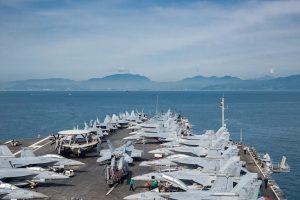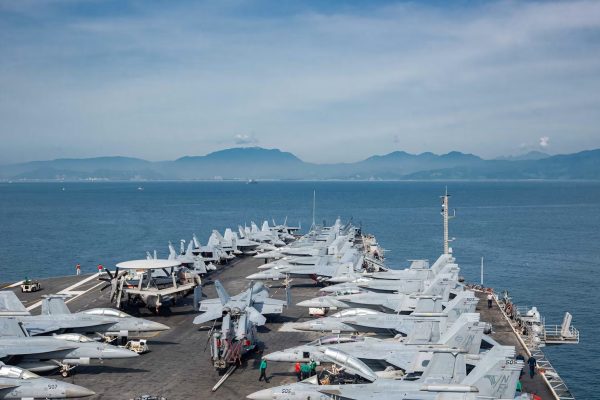ASEAN Beat | Diplomacy | Southeast Asia
The visit of the USS Ronald Reagan came as Vietnam’s Prime Minister Pham Minh Chinh embarked on his first visit to Beijing since his appointment in 2021.

The U.S. Navy’s only forward-deployed aircraft carrier, USS Ronald Reagan (CVN 76), approaches Danang, Vietnam, for a scheduled port visit on June 25, 2023.
Credit: U.S. Navy photo by Mass Communication 3rd Class Jordan Brown
A U.S. aircraft carrier and two guided missile cruisers have arrived in Vietnam on a six-day friendship visit, marking another milestone in the advancing relations between the two former wartime enemies.
The USS Ronald Reagan and the guided missile cruisers USS Antietam and USS Robert Smalls arrived in Danang on Sunday, the third such visit since 2018, and will remain in the port until June 30. According to The Associated Press, officers from the Ronald Reagan disembarked on Sunday and were greeted by Vietnamese officers after mooring in Danang.
“We’re excited to come to Vietnam and appreciate the welcome our strike group has received,” Rear Adm. Pat Hannifin, the strike group’s commander, said in a statement announcing the ships’ arrival. “Visits like this reinforce our partnership and commitment to confronting shared challenges in the maritime domain. They also provide a great opportunity for our Sailors to engage with the Vietnamese people and culture.”
According to the U.S. Navy’s statement, while in Vietnam the crewmembers will engage in a number of public diplomatic activities, including “cultural and professional exchanges such as community service projects, sports competitions, and receptions.” Of course, the fact that these innocuous friendship exchanges will take place in the towering and well-armed hulk of a Nimitz-class nuclear-powered aircraft carrier, moored in the South China Sea no less, makes this much more meaningful than garden variety public diplomacy.
Diplomat Brief
Weekly Newsletter
N
Get briefed on the story of the week, and developing stories to watch across the Asia-Pacific.
Get the Newsletter
The port call follows visits to Vietnam this year from Trade Representative Katherine Tai (February), USAID head Samantha Power (March), Secretary of State Antony Blinken (April), part of a concerted attempt by the Biden administration to bolster partnerships in what it terms the “Indo-Pacific.” In particular, U.S. officials are pushing Hanoi to upgrade the bilateral relationship from a “comprehensive” to a “strategic” partnership to mark the 10th anniversary of the establishment of the “comprehensive” partnership in 2013.
Despite the overall positive trajectory of relations, however, Vietnam has resisted an upgrade, viewing the substance of ties more important than the label that is placed on them and concerned (among other things) about how its neighbor and frenemy China might view and respond to such a step. This week’s carrier port call comes a year after Vietnam reportedly cancelled a similar visit by the Ronald Reagan, supposedly due to fears that it might be misinterpreted by Beijing amid tensions in the South China Sea.
As I noted last week, Vietnam feels the need to reassure China that each step forward in relations with the U.S. is consistent with Vietnam’s omnidirectional foreign policy, which eschews binding superpower alignments, and is not a move directed at China.
As another illustration of this foreign policy doctrine in action, Radio Free Asia reported that Vietnamese Prime Minister Pham Minh Chinh arrived in Beijing yesterday and met with his Chinese counterpart Li Qiang. The trip was his first official visit to China since taking office in 2021.
Advertisement
As one commentator on Vietnamese politics characterized it to the U.S. funded broadcaster, the timing of the two events was akin to “seeing off one person at the front door while welcoming another at the rear.” If and when Vietnam agrees to upgrade the relationship with the U.S., it will long have prepared the ground carefully to ensure that its relations with China – its most complex and important bilateral relationship – remain on a stable footing.
